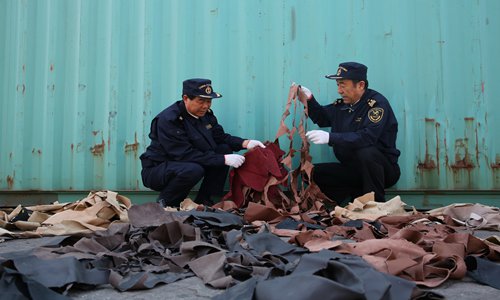
Chinese customs officers check illegal trash imports they seized during a crackdown on waste smuggling in Qingdao, East China's Shandong Province, on Tuesday. (Photo: IC)
Chinese media and society have compared the crackdown on illegal waste import to the "destruction of opium" in the 19th Century as customs authorities conducted a nationwide campaign against trash smuggling.
The General Administration of Customs (GAC) announced on Tuesday seizing 137,000 tons of illegal trash imports in the crackdown on waste smuggling in May, according to a statement sent to the Global Times by GAC.
Altogether 1,291 customs officers from 17 provinces and municipalities, including Tianjin, Shanghai and Beijing, participated in the operation simultaneously, confiscating scrap metal and waste mineral residue, GAC said, adding that it also found evidence of 606,500 tons of more illegal waste. News account Buyidao on WeChat called the operation "destruction of opium at Humen of the new era."
These seized items carried Japanese, Korean, English and Thai letters. Some are extremely filthy with unidentified spillages on them, media reported.
On June 3, 1839, Lin Zexu, a senior official of the Qing Dynasty (1644-1911), ordered that 1,000 tons of smuggled opium, confiscated from foreign dealers in China, be set on fire in Humen, Guangdong Province.
In a throwback to the historic parallel, Chinese media and netizens deemed the trash crackdown a sign that the country is determined to bury the problem of importing trash.
It was the third crackdown on trash smuggling by GAC this year since the ban on waste import took effect in January. So far, 249 suspects from 81 smuggling rings have been detained, with 217,000 tons of trash seized.
China was the world's largest importer of solid waste since it began acquiring it as a source of raw materials in the 1980s.
However, amid rising public awareness and a green development drive in recent years, the government decided last year to phase out and completely halt such imports by the end of 2019, except those containing resources that cannot be substituted, Xinhua reported.
Measure lauded
Many Chinese media hailed GAC's campaign against foreign waste smuggling as a huge victory and a boost to national morale.
"These countries should deal with their own waste. China was the dumping ground for world's trash for decades, but now we are stronger and will not play that role anymore," said a user of Sina Weibo.
Simply cracking down on foreign trash is not enough for saving the environment, the government also needs to improve its industrial structure, adjust categories of waste and subsidize renewable energy industries, Zhang Boju, secretary-general of Friends of Nature, an environment protection NGO, told the Global Times.
In March 2017, China issued a plan requiring 46 cities to carry out mandatory garbage sorting by the end of 2020. All public institutions and companies are required to separate hazardous waste, kitchen trash and recyclable materials, said Xinhua.
Moreover, the ban on foreign waste will also push China's domestic recycling industry to better its technology and standards, Liu Jianguo, a professor specializing in solid waste management at Tsinghua University, told the Global Times.
The campaign against smuggled solid waste will be stepped up in the near future, he noted.
After the ban, many local Chinese governments launched a campaign to bust smuggled waste.
America's plea
However, the ban on imported waste encountered obstacles from home and aboard.
The largest exporters of waste to China, including some European countries and the US, also panicked after the ban.
The Guardian said that "rubbish is already building up at UK recycling plants due to China import ban."
The US government in March even asked China not to implement the ban. "We request that China immediately halt implementation and revise these measures in a manner consistent with existing international standards for trade in scrap materials, which provide a global framework for transparent and environmentally sound trade in recycled commodities," an US official was quoted by Reuters as saying.
Some Western countries advocate environmental protection at the same time trying to let other developing countries help them deal with their mounting rubbish, which is hypocritical, said Liu, adding that Chinese ban on imported waste also helps Western countries enhance their garbage disposal ability.
Besides, China is acting under the Basel Convention, which regulates the flow of hazardous waste between countries, and trade for dealing with imported rubbish is based on mutual willingness, he added.


